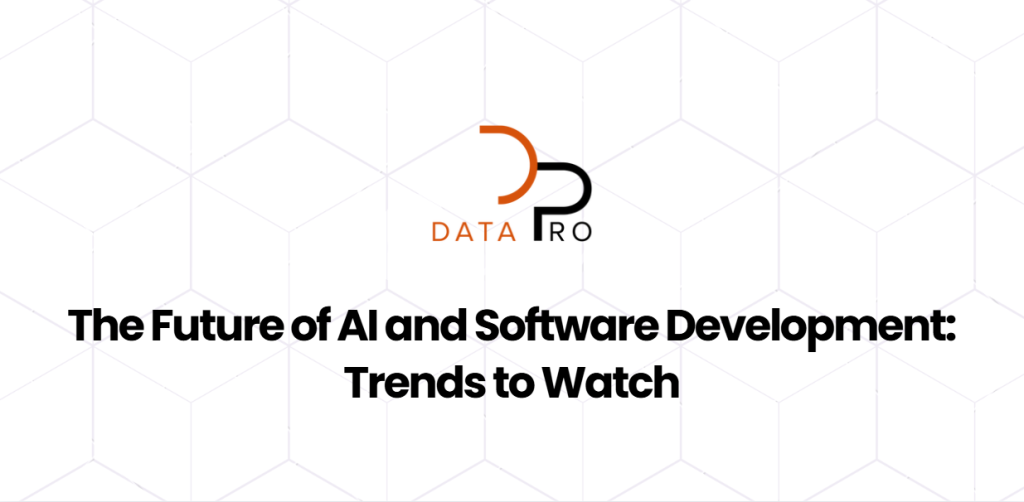
The Future of AI and Software Development: Trends to Watch
Software development is undergoing a transformative shift, driven by rapid advancements in artificial intelligence (AI), automation, cloud computing, and security. As industries adapt to these changes, understanding the trends shaping the future of AI and software development is essential for staying ahead. By 2025 and beyond, key innovations will redefine how software is designed, built, and deployed. This article explores the most significant trends that will shape the future of software development and their potential impact on various industries.
1. AI-Driven Software Development
Artificial intelligence is becoming a cornerstone of software development, streamlining workflows, improving efficiency, and enhancing creativity. AI-powered tools such as GitHub Copilot and OpenAI Codex are revolutionizing code generation, enabling developers to write high-quality code faster.
Additionally, AI is transforming software testing by identifying bugs and vulnerabilities before deployment. Machine learning (ML) algorithms can predict and prevent security threats in real time, ensuring software reliability. As AI continues to advance, its role in automating development processes will expand, allowing for more intelligent and efficient software solutions.
2. The Rise of Low-Code and No-Code Development
The demand for faster application development is fueling the growth of low-code and no-code platforms. These tools empower individuals with minimal coding experience to build complex applications through visual interfaces, significantly reducing development time and costs. Leading platforms such as OutSystems and Mendix are enabling businesses to innovate without requiring extensive technical expertise.
As these platforms evolve, they will offer greater customization, integration, and scalability. This trend will democratize software development, making it more accessible to startups and enterprises alike, allowing them to create powerful applications with minimal coding effort.
3. Cloud-Native and Serverless Computing
Cloud computing has long been a driving force in software development, but the future lies in cloud-native and serverless architectures. Platforms such as AWS Lambda and Google Cloud Functions are eliminating the need for infrastructure management, enabling developers to focus solely on application logic.
Serverless computing allows businesses to scale applications efficiently while reducing costs. Advanced container orchestration with Kubernetes and the adoption of microservices architectures will make cloud-native development the standard for modern applications, offering greater flexibility and resilience.
4. Cybersecurity-First Development
With cyber threats growing more sophisticated, software security is no longer an afterthought but a fundamental necessity. The adoption of DevSecOps integrating security practices throughout the software development lifecycle is increasing. Tools such as Snyk and SonarQube are being widely used to identify and mitigate vulnerabilities early in development.
Regulatory compliance, data privacy, and encryption will become key focus areas as businesses strive to protect sensitive information. Companies will need to prioritize security frameworks, ensuring robust protection for both cloud-based and on-premise applications.
5. The Expansion of Progressive Web Applications (PWAs) and Cross-Platform Development
Progressive Web Applications (PWAs) are reshaping the way users interact with software by offering a seamless experience across web and mobile platforms. PWAs provide fast performance, offline functionality, and enhanced user engagement, making them a preferred choice for businesses.
Similarly, cross-platform development frameworks like Flutter and React Native continue to gain traction, allowing developers to create high-performance applications with a single codebase. As businesses seek cost-effective and efficient development solutions, PWAs and cross-platform frameworks will play a crucial role in shaping the future of software applications.
6. Quantum Computing’s Emerging Role
Quantum computing is still in its early stages, but research by IBM, Google, and others is paving the way for groundbreaking applications. Quantum algorithms have the potential to revolutionize industries such as cryptography, logistics, and AI-driven analytics.
While mainstream adoption is still years away, early experimentation with quantum computing is expected to accelerate. As advancements continue, software developers will need to explore quantum programming languages and frameworks to stay ahead of this technological evolution.
7. Blockchain Beyond Cryptocurrency
Blockchain technology is expanding beyond its traditional use in cryptocurrencies, finding applications in secure transactions, digital identity verification, and smart contracts. Decentralized applications (DApps) powered by Ethereum and Hyperledger are becoming more prevalent in industries such as healthcare, supply chain management, and legal services.
As blockchain technology matures, businesses will leverage it for increased transparency, security, and efficiency in digital transactions. The integration of blockchain into enterprise solutions will further enhance trust and decentralization across various sectors.
8. Remote and AI-Driven Software Development Teams
The rise of remote and distributed teams is reshaping software development practices. Cloud-based collaboration tools such as GitHub, GitLab, and Atlassian’s suite are facilitating seamless communication and project management among globally distributed teams.
AI-driven project management tools will further optimize remote development, automating task allocation, performance tracking, and code quality assessment. Companies will invest in advanced security measures to safeguard intellectual property and sensitive data in a distributed work environment.
9. IoT-Enabled Software Development
The Internet of Things (IoT) continues to expand, with smart devices becoming increasingly prevalent in industries such as healthcare, manufacturing, and smart homes. Developing software for IoT requires specialized expertise in real-time data processing, security, and connectivity.
Platforms such as AWS IoT and Google Cloud IoT provide developers with the tools needed to create and manage IoT applications efficiently. As IoT adoption grows, software developers will focus on optimizing applications for edge computing, AI-driven automation, and energy-efficient operations.
10. AI-Powered DevOps and Continuous Automation
DevOps is evolving beyond traditional practices with the integration of AI and automation. AI-powered DevOps tools such as Jenkins X and Harness are streamlining software deployment, performance monitoring, and error resolution.
Automated testing and predictive analytics are reducing software defects and improving system reliability. As AI capabilities advance, DevOps teams will increasingly rely on intelligent automation to accelerate development cycles and enhance software quality.
Conclusion
The future of AI and software development is shaped by rapid advancements in automation, security, and emerging technologies. Businesses and developers must adapt to these changes to stay competitive in the evolving landscape.
By embracing AI-powered development tools, cloud-native architectures, security-first approaches, and blockchain applications, software professionals can build more scalable, secure, and innovative solutions. Staying ahead of these trends will be essential for companies aiming to drive digital transformation and long-term success in the ever-changing tech industry.
Innovate With Custom AI Solution
- 12 Courtyard Pl,
Lexington, MA 02420 - (617)319-0174
- corp@dataprocorp.tech
